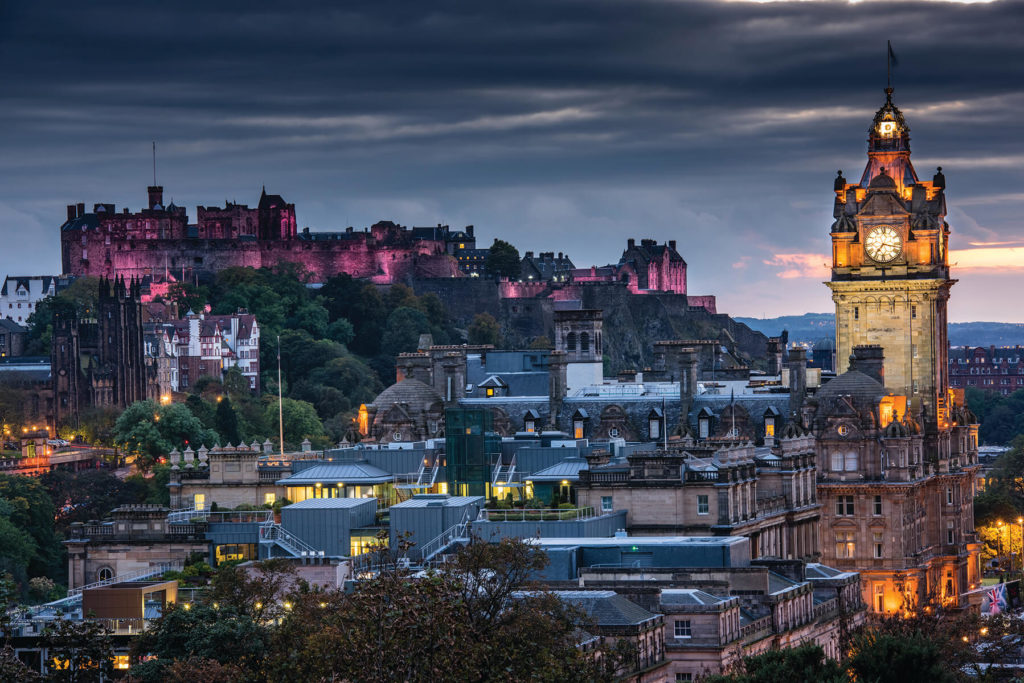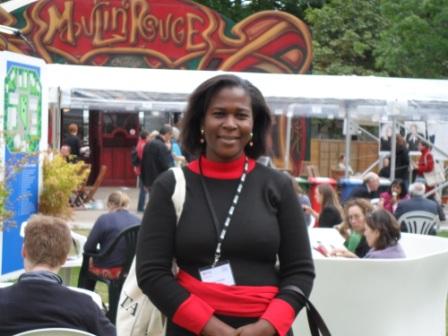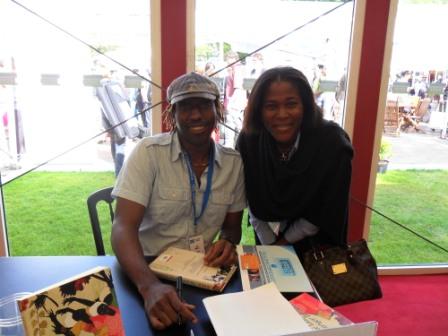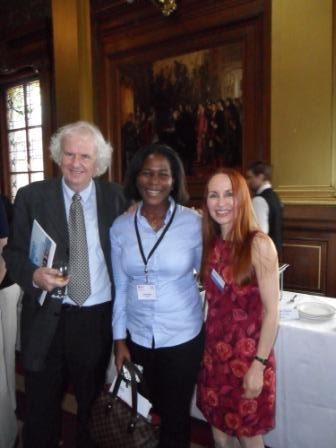
DAY ONE: EDIN HERE I COME!
It‘s Thursday 19th August 2010 and I am just walking into room 520 in my hotel in Scotland’s capital city. Once I’d accepted the British Council nomination to represent Nigeria at the world’s biggest literary festival about 2 months ago, I had to learn to spell the name of the city …
E-D-I-N-B-O-R-O-U-G-H, E-D-I-N-B-R-O-U-G-H… or something like that.
I’ve always tried to avoid spelling the name of this particular city’s because no matter how hard I tried, I just never seemed to get it right. The way I’d heard it pronounced—with a certain roll to it—didn’t make things any easier! So I decided that until I mastered the spelling, I would simply call the city Edin. Next I set out to find out what links, if any, I had with Edin. I found three: my children’s former teacher, Miss Tracy; my husband’s niece, Djanjo; and Helen, a lady I’d known during my Uni days in Lancaster.
Good traveller that I am, I had decided to read as much as I could about Edin, before my trip. But somehow I never got around to it. And so I find myself in Edin, seeking information from the best source after the hairdresser—the taxi drivers! My first ‘informant’ conveyed me from the airport to my hotel in the West End of the city. He is the second person to tell me that the Caledonian Hilton—my ‘home’ while in Scotland—is a “very nice” hotel. I thoroughly enjoy the 20 minute ride in his company; we talk about Scottish history, sports, music and of course: summer in Edin, when the city’s population doubles as visitors troop in for the 9 festivals: the International Festival, Festival Fringe, Book Festival, Film Festival, Military Tattoo, Jazz Festival, Art Festival, EdinMela and Festival of Politics.

On arrival at the hotel, I have to agree that it’s ‘very nice’ indeed. It is a four star; your typical upscale British Hotel with a seemingly ordinary outward appearance but as you sail through the swing door, you are transported into this opulent Victorian-style atmosphere with its rich traditional decor and understated class. My room is big enough to hold a six-spring bed and yet I can’t recall ever sleeping in a more comfortable bed. I fall in love with the bathroom, which seems unusually big for the size of the room it’s adjoined to. I appreciate the old fashioned ‘armitage shank’ bath gadgets. What a refreshing change from having to do everything by the touch of a button!
This evening there is a reception for the delegates of the British Council Bookcase: there are 50 of us from 36 countries, all working in the field of literature. I chat with Saman from Iraq, Beth from New York, Irfan from Indonesia. As I begin to wonder if any other African country is represented, Jenny comes over and introduces herself as the South African delegate. She adds somewhat humorously that when she tells people she‘s African, they wonder why she is so pale. I smile. After dinner, we are formally welcomed and the team that will be taking care of us for the next 4 days is introduced to us.
Thereafter we proceed to the Scottishpower Studio Theatre in Charlotte Square, ‘home of the largest public celebration of books in the world’: the Edinburgh International Book Festival (EIBF). We participate in an interactive session with author Alex Preston. It turns out to be an engaging hour, which begins and ends with the author reading from his book The Bleeding City.
I finally retire at almost midnight, after a light evening of readings, performance and music in a ‘pub’ called the Spiegeltent. Lorraine Mariner is enthralling as she reads from her poems while the very talented John Hegley has us all in stitches, his face straight, as he recites his verses to the accompaniment of a mandolin. It is a happy ending to a day that had a dark cloud cast over it by the news that Edwin Morgan, 91-year-old Scottish poet, passed away this morning.
DAY TWO: EASING IN
The hours of the night seem just a wee bit too short. Because I woke up late, I have to rush through breakfast to make it on time to Charlotte Square. Today we meet 3 of Britain’s greatest writers: A.S. Byatt, Janice Galloway and Alan Warner. Later on in the day, we also witness Byatt receive the James Tait Black Memorial Prize, following in the steps of the likes of Graham Green and E. M. Forster.
In between the various sessions, we have the opportunity to get acquainted with some more of the British Council Bookcase delegates: Sigrid from Belgium, Eleanor from Canada, Lucy from China –some are British Council staff, some are writers, others publishers. There are also academics and literary festival directors amongst us. I feel completely at home amongst my ‘tribesmen’.
This afternoon, in the bus, on the way to the Scottish National Library, my mind takes a journey 25 years back: I am a teenager representing Nigeria at the Kirby Smith Youth Camp organised by the Lions Club International in Arizona, USA. “Second time around”, as the popular song says. I consider it an honour as well as a burden to represent a country I love so much, but that is not always good to me. It is also 25 years that the EIBF was launched. Since 1985, for 17 days each August, over 800 authors from more than 45 countries and about 200,000 visitors congregate to celebrate ideas and literature.
I awake from my reverie as we disembark at the National Library of Scotland where we have a networking session, lunch and a tour of the library. This proves to be another experience in Scottish history and culture. The National Library of Scotland is one of some 100 libraries in this city and home to over 14 million printed items.
As we go round Edin, I notice the letters ‘RBS’ a number of times and I am curious to know what this means. In my mind, RBS always stands for our bookshop back home: the Rainbow Book Shop and when a ‘C’ is substituted for the ‘S’, it is the Rainbow Book Club. I soon learn that here in Scotland, RBS is an abbreviation for the Royal Bank of Scotland, a major sponsor of the EIBF. The venue where the readings take place with large audiences in attendance is called the RBS Main Theatre. Other sponsors of the EIBF include Deloitte, The Scottish Oil Club, the Open University, while The Times is a media partner. Amongst the supporters are foreign embassies in London, publishing houses and literary agencies.
Today I return to the hotel not so tired. For the first time I notice the photos on display by the lift in the lobby. As I study them I realise that I am not the only important person to lodge in this hotel. Others include Roy Rogers and Dale Evans, PM Mikhail Govbacek and Edinburgh’s most famous son: Sean Connery!
When I get to my room, it is still daylight and I am able to seat at the window and take in the picturesque view my room affords me. Though all the houses are a dull brown and the roofs different shades of grey, the view is enchanting and I almost expect to see Bert and Mary from Walt Disney’s 1964 musical classic, Mary Poppins dancing on the roof tops, singing “Chim Chim Cher-ee”. while Jane and her younger brother, Michael, whom Mary Poppins has been hired to look after, stand in front of the Caley, wide-eyed, observing the spectacular performance.
As i drift off to sleep, I hear the voice of my daughter and her younger brother … “Mummy make sure you see Miss Tracy….”
DAY THREE: MINGLING
We start off the day having breakfast with the Edinburgh International Book Fair (EIBF) Director, Nick Barley. He is generous with information on his experience in organising what, in his own words, is “the largest and most vibrant literary event in the world”. We are enlightened and impressed by the amount of passion and industry that goes into putting together this programme of over 570 events.
Back home, one of the many caps I wear is Festival Director of the Garden City Literary Festival which holds annually in Port Harcourt, the capital city of Rivers State in Nigeria. The Garden City Literary Festival is the realisation of a dream of the Rivers State Governor, Rt. Hon. Chibuike Rotimi Amaechi, a graduate of literature and a lover of the arts. Now into its third year, the festival has headlined some of the greatest writers of our time including Nobel Laureate Wole Soyinka (in 2008) and Ngugi wa Thiong’o (in 2009). We expect Prof. Chinua Achebe next year. The Garden City Literary Festival, the first of its kind to take place in Nigeria, includes a book fair, a writers’ conference, writers’ workshops, interactive forums, readings, performances and special events for children. Another cap on my head is founder of the Rainbow Book Club, initiators of the ‘Get Nigeria Reading again!’ campaign, which has run now for 6 years. It is in recognition of my involvement in these two endeavours that I have the privilege of representing Nigeria at the EIBF and what a year to do so: 2010, when Nigeria is celebrating 50 years of independence.
After an interactive session with fantasy writers; Russell Celyn and Owen Cheers, I take the afternoon off to wander a bit around Edin. As I walk down Princes Street, the sound of the bagpipe and the sight of tartan dominated gifts and souvenirs in shop windows serve as a reminder that I am in Scotland. Across the road, I look up and sight the famous Edin Castle, a stream of tourists snake their way up and down the path that leads to it. When I begin to feel exhausted I jump into a taxi and head for St James shopping centre. I might as well be in London—all the major shops are here: Frasers, Boots, Russell and Bromley, John Lewis, the list goes on and on and on.
I return in time to participate in a 5pm session with Meaghan Delahunt (Australia), Neel Mukherjee (Indian) and Kamila Shamsie (Pakistani). They all read from their books. Then they discuss the challenges of stereotypes and assumptions that are made about their writing by the West. I understand.
We take part in an interesting discussion on the manifesto for culture moderated by Charlotte Higgins, Chief Cultural Editor of The Guardian. The panel consist of Culture Minister ,Fiona Hyslop; Director of the National Theatre of Scotland, Vicky Featherstone; and Director of Tate Britain, Penelope Curtis.
That evening, myself, Canan (from the Netherlands), Alison (from Italy) and Ivan (from Denmark) head to a restaurant for fish and chips. We discuss various issues ranging from feminism to gay rights, the notion of good and evil. Ivan keeps his warm, caring smile; it serves as a cooling effect, in the midst of three women exchanging strong and opposing views.
At the end of the day, I collapse into my bed. It is very late at night; I am haunted by the fact that I have not as yet contacted Miss Tracy. I fall asleep and wake up early the next day continually amazed at the fact that I somehow manage to stay within the confines of my 6-spring bed.
DAY FOUR: PEOPLE AND PLACES
At this morning’s session, Kia Miller, Jamaican author, holds us spellbound as he reads from his book; The Last Warner Woman. So powerful is his delivery that a woman from the audience (speaking for us all) announces to him, “I do not want to read your book. I want you to read it to me”. On behalf of us all, she goes on to ask him whether he is considering making an audio recording of the book. I wonder whether it is just his excellent reading or the common Jamaican roots we share (mine is from my Jamaica mother) that makes him my favourite author at the festival. Nadifa Mohamed then reads from her book Black Mamba Boy, which is on the long list for the prestigious Orange prize. I trail the writers to the bookshop for their autographs. I get my books autographed alright, but I also manage to get a photo with both writers.
I also get DBC Pierre’s autograph, after his interactive session. I find this author to be down-to-earth and brilliant. When I get ‘my time’ with him, he tells me that his father worked in Ibadan, which is in the south-west of Nigeria. I feel an instant bond with him. We share a couple minutes bantering. I tell him about our Garden City Literary Festival. He says he would be delighted to come to Nigeria.
In the evening, I make out time to see Tayo Aluko’s ‘Call Mr Robeson’ at the Zoo Southside (studio). I had called up Djanjo and we agreed to meet at the entrance of the theatre. Until Tayo invited me, I had never heard of Mr Robeson. In this solo performance, Tayo plays Mr Robeson, an African-American actor, singer and civil rights campaigner who got into trouble with the establishment for being outspoken and radical. His career suffered a setback as he was branded a traitor, harassed and denied opportunities to perform or travel. These, combined with personal challenges, led him to near madness and attempted suicide. Mr Robeson is relieved when he is allowed once again to travel and perform. Tayo, a Nigerian, British-trained architect took to his passion of acting years ago. He has performed around the UK, in the US and in Lagos. This play has won the Argus Angel Award, Best Male Performer and been nominated as Best Show in the Brighton Festival Fringe.
Earlier today we had lunch at the City Chambers, another historical monument to the credit of this UNESCO’s first city of literature. Edinburgh has been home to Robert Louis Stevenson, J M Barrie (creator of Peter Pan and Wendy) and more recently, JK Rowling. To get to the City Chambers, we have to navigate through the street parties of Edin’s Festival fringe. There are a myriad of activities going on. There are clowns, human monuments, face and portrait painters, ‘magicians’ … you name it. At the City Chambers we hear from Edinburgh’s poet laureate, Ron Butlin, who, by the way, tells me he once spent an unforgettable time in Nigeria, travelling between Lagos, Ibadan, Benin and Kano.
Our last activity for today is a party where there is, again, ample opportunity to mingle. A delegate from South Africa, who was unable to make it to the London Book Fair due to the Ash Cloud that hung over Britain in April, is here. South Africa’s Poet Laurete, KW Ngositsile greets us briefly, reminding us how we can build bridges between cultures and people through poetry. During this festival other South African Writers will feature: Mandla Langa (exiled ANC member), Kopano Matlwa (Afrikaans writer) and Marlene Van Niekere (winner of the Wole Soyinka prize for African Literature). It is at the end of the day I learn that famed children’s author, Jacqueline Wilson was at the Festival earlier that day.


DAY FIVE: GOODBYE EDINBURGH
This morning I send an email to Miss Tracy after a failed attempt to get her details from the telephone exchange. She responded that she was at the other end of the country, getting ready to leave for Romania to take on another teaching job. When I return to Nigeria I can tell my children that I did get in touch with the unforgettable Miss Tracy, their former teacher.
I am booked on the British Airways flight to London at 5:20 today. My stay in Edinburgh has been both hectic and enriching. Load of thoughts are buzzing round in my head: Scotland, like my beloved Nigeria, has given the world great authors. Back home, our Garden City Literary Festival could be considered a miniature Edinburgh International Book Festival as we too have readings with eminent writers; we organise workshops; we host discussion panels and have special programmes for children. At breakfast my fellow delegates and I continue to exchange stories and ideas. Many of them are keen to hear of the work of the Rainbow Book Club in encouraging the love of book and reading for development of society. I share with them how we have run book clubs for children, and organised writing competitions and sessions with authors. We are also taking the reading campaign into the wider society by getting role models to read to children and to share their stories about how the love of books have shaped their lives. Such role models have included a former Commonwealth Secretary General, Governors, Ministers and a Nobel Laureate for literature. I also share with them one of the most fulfilling projects we have undertaken, which is the work amongst children in rural communities where we organised reading lessons for them, set up book clubs and ran a mobile library.
Determined to enjoy my last day in Edinburgh, I take my time waking up, eat a leisurely breakfast and head to the reception desk to check out at noon. As I get set to pay for the ‘extras’ (that is the expenses I incurred which are not within my contract with the British Council), I am told the British Council has picked up the bill. Surely there must be a mix up! I insist that the man at the hotel reception crosscheck and he puts a call through to the BC contact. They confirm that I am right. He refunds their money and accepts mine.
I leave my packed suitcases in the hotel and hit the road. It is drizzling and I don’t have an umbrella but I don’t care. I make a dash for a bus stop across the road in time to catch a tour bus. I give the driver 12 pounds and hop on. Before I complete the tour, I hop off and make my way to another reliable information outlet: the charity shops. Over the years I have learnt that charity shops can be a treasury of wonderful and rare books, for purchase at next to nothing. I buy so many books that I become worried that I will have to pay so much in excess luggage. From some of the books I have gone through, I understand that Scotland has a rich Christian heritage. I learn this from listening to the authors and reading. There is even a Bible in my hotel room. As I wait in line to pay for my books, I notice the man in front of me is wearing a skirt; it is the traditional Scottish kilt. Back home in Nigeria I would not be able to take him to my church because the pastor says God says women are not to wear trousers, it is only logical to me then that the pastor’s God does not allow men to wear skirts!
The bus tour affords me an opportunity to visit the famous Edinburgh castle. During the course of the tour I also learn a bit more about the land that produces the Scotch whisky that always adorned my late father’s chest of drinks. I am inclined to agree that “There are two Edinburghs. There’s the cityscape of caste, crags, tenements and Georgian elegance. And then there’s the mental landscape of ideas, stories and larger than life characters. Each inspires and enriches the other.”

